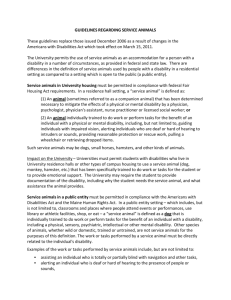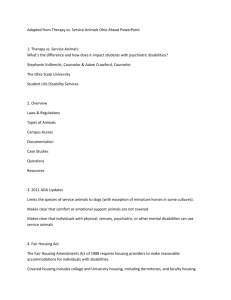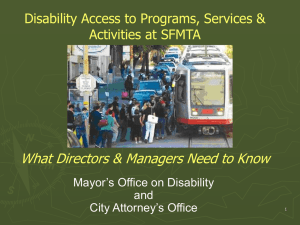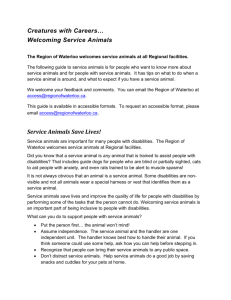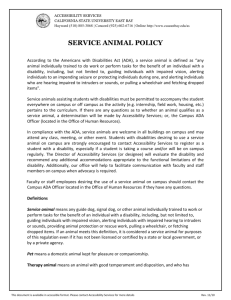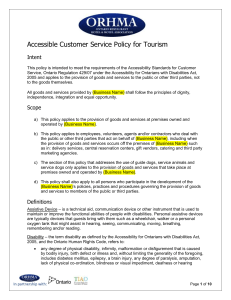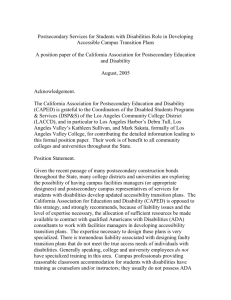Service Animal Guidance
advertisement
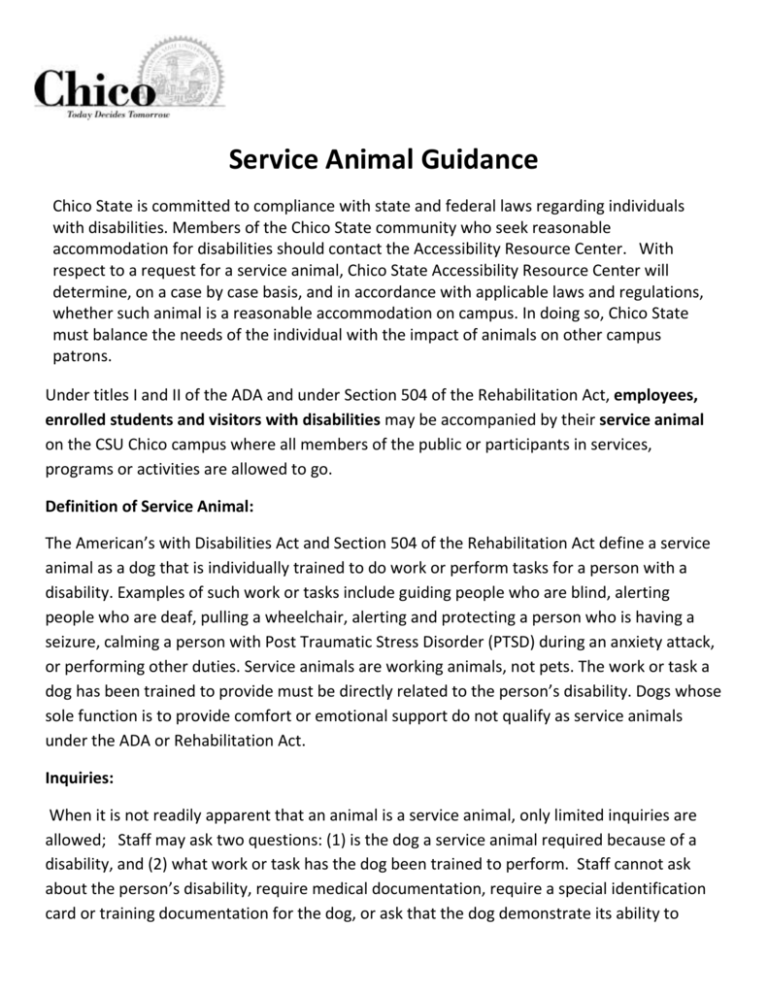
Service Animal Guidance Chico State is committed to compliance with state and federal laws regarding individuals with disabilities. Members of the Chico State community who seek reasonable accommodation for disabilities should contact the Accessibility Resource Center. With respect to a request for a service animal, Chico State Accessibility Resource Center will determine, on a case by case basis, and in accordance with applicable laws and regulations, whether such animal is a reasonable accommodation on campus. In doing so, Chico State must balance the needs of the individual with the impact of animals on other campus patrons. Under titles I and II of the ADA and under Section 504 of the Rehabilitation Act, employees, enrolled students and visitors with disabilities may be accompanied by their service animal on the CSU Chico campus where all members of the public or participants in services, programs or activities are allowed to go. Definition of Service Animal: The American’s with Disabilities Act and Section 504 of the Rehabilitation Act define a service animal as a dog that is individually trained to do work or perform tasks for a person with a disability. Examples of such work or tasks include guiding people who are blind, alerting people who are deaf, pulling a wheelchair, alerting and protecting a person who is having a seizure, calming a person with Post Traumatic Stress Disorder (PTSD) during an anxiety attack, or performing other duties. Service animals are working animals, not pets. The work or task a dog has been trained to provide must be directly related to the person’s disability. Dogs whose sole function is to provide comfort or emotional support do not qualify as service animals under the ADA or Rehabilitation Act. Inquiries: When it is not readily apparent that an animal is a service animal, only limited inquiries are allowed; Staff may ask two questions: (1) is the dog a service animal required because of a disability, and (2) what work or task has the dog been trained to perform. Staff cannot ask about the person’s disability, require medical documentation, require a special identification card or training documentation for the dog, or ask that the dog demonstrate its ability to perform the work or task. For students and employees with disabilities, the Accessibility Resource Center (ARC) may require that documentation be provided on the letterhead of a treating physician or mental health provider, which permits the ARC to determine if the dog is a service animal. Responsibilities of Individuals with Service Animals: Individuals with disabilities are responsible for the control of their service animals at all times and for ensuring the immediate clean-up and proper disposal of all animal waste. Individuals must comply with all applicable laws and regulations, including vaccination, licensure, animal health and leash laws. The University is not responsible for the care or supervision of service animals. Individuals with disabilities are responsible for any damage caused by their animals and must take appropriate precautions to prevent property damage and injury. Other Guidance: Allergies and fear of dogs are not valid reasons for denying access or refusing service to people using service animals. When a person who is allergic to dog dander and a person who uses a service animal must spend time in the same room or facility, for example, in a school classroom, they both should be accommodated by assigning them, if possible, to different locations within the room or different rooms in the facility. The Department of Justice explicitly rejects the idea that service dogs can be restricted by state and local governments based on breed. No county or city ordinance on breed restrictions supersedes the ADA. Establishments that sell or prepare food must allow service animals in public areas even if state or local health codes prohibit animals on the premises. State and federal laws say that licensed service animal trainers shall be afforded the same rights and access as those provided to persons who use service animals. The key word is licensed. Professional trainers need to be licensed via the Department of Consumer Affairs – State Board of Guide Dogs for the Blind (according to California Civil Code Section 54.2/FEHA). It is allowable for a person with a disability to train his/her own dog, but this does not extend to professionals who are training dogs with respect to gaining access to public places. Getting Help If you need help . . . Contact . . . . . . requesting a service animal in university housing Accessibility Resource Center (530) 898-5959 …requesting to have a service animal on campus grounds (outside of housing), and you are a student Accessibility Resource Center (530) 898-5959 . . . requesting to have a service animal on campus grounds, and you are faculty or staff Sandy Parsons, ADA Coordinator 898-6383 . . . requesting a service animal on campus grounds, and you are a visitor Sandy Parsons, ADA Coordinator 898-6383 . . . reporting an unruly or unlicensed service animal on campus Sandy Parsons, ADA Coordinator 898-6383 Or University Police Department 898-5555


